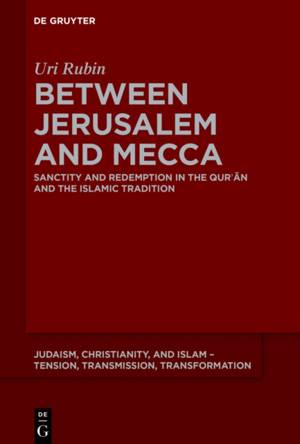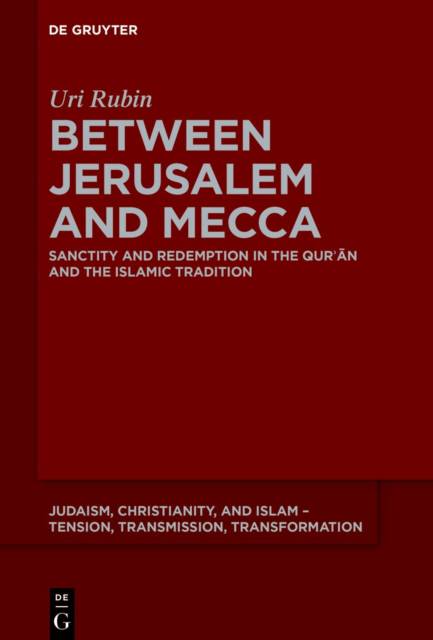
Bedankt voor het vertrouwen het afgelopen jaar! Om jou te bedanken bieden we GRATIS verzending (in België) aan op alles gedurende de hele maand januari.
- Afhalen na 1 uur in een winkel met voorraad
- In januari gratis thuislevering in België
- Ruim aanbod met 7 miljoen producten
Bedankt voor het vertrouwen het afgelopen jaar! Om jou te bedanken bieden we GRATIS verzending (in België) aan op alles gedurende de hele maand januari.
- Afhalen na 1 uur in een winkel met voorraad
- In januari gratis thuislevering in België
- Ruim aanbod met 7 miljoen producten
Zoeken
Between Jerusalem and Mecca
Sanctity and Redemption in the Qurʾān and the Islamic Tradition
Uri Rubin (Zl)
€ 126,45
+ 252 punten
Uitvoering
Omschrijving
This book sheds new light on Jerusalem's status in early Islam. The sanctity of the city is already discerned in the Qurʾān. The vision of redemption that the Qurʾān displays coincides with the messianic expectations that have swept throughout the entire region, especially among the Jews, due to the attempted renewal of Jewish liturgy in Jerusalem following the Persian victory over Byzantium in 614.
On the other hand, the Qurʾān also portrays the holiness of Mecca and the Kaʿba. This book shows how it promotes their pre-Islamic holiness around the image of Abraham and Ishmael. The changing balance between the sanctity of Jerusalem and the sanctity of Mecca, in favor of the latter, is noticeable in the Qurʾān as one proceeds from the Meccan sūras to the Medinan ones. The change occurs against the background of the twist in relations between Muḥammad and the Jews. This book also points out the correlation between Muḥammad's situation in Medina and events in Palestine involving the victory of the Byzantines over the Persians in 628, as alluded to in the opening passage of Sūrat al-Rūm (30).
Thie work illuminates the growing sanctity of Jerusalem following the arrival of the first Muslims to Palestine. As in the Qurʾān, Mecca continued to struggle to preserve its status as a holy city vis-à-vis that of Jerusalem. Key aspects of this struggle are reflected in traditions in which patterns of sanctity move from Jerusalem to Mecca, and which this book also scrutinizes.
On the other hand, the Qurʾān also portrays the holiness of Mecca and the Kaʿba. This book shows how it promotes their pre-Islamic holiness around the image of Abraham and Ishmael. The changing balance between the sanctity of Jerusalem and the sanctity of Mecca, in favor of the latter, is noticeable in the Qurʾān as one proceeds from the Meccan sūras to the Medinan ones. The change occurs against the background of the twist in relations between Muḥammad and the Jews. This book also points out the correlation between Muḥammad's situation in Medina and events in Palestine involving the victory of the Byzantines over the Persians in 628, as alluded to in the opening passage of Sūrat al-Rūm (30).
Thie work illuminates the growing sanctity of Jerusalem following the arrival of the first Muslims to Palestine. As in the Qurʾān, Mecca continued to struggle to preserve its status as a holy city vis-à-vis that of Jerusalem. Key aspects of this struggle are reflected in traditions in which patterns of sanctity move from Jerusalem to Mecca, and which this book also scrutinizes.
Specificaties
Betrokkenen
- Auteur(s):
- Uitgeverij:
Inhoud
- Aantal bladzijden:
- 257
- Taal:
- Engels
- Reeks:
- Reeksnummer:
- nr. 22
Eigenschappen
- Productcode (EAN):
- 9783111220079
- Verschijningsdatum:
- 4/10/2023
- Uitvoering:
- Hardcover
- Formaat:
- Genaaid
- Afmetingen:
- 155 mm x 234 mm
- Gewicht:
- 498 g

Alleen bij Standaard Boekhandel
+ 252 punten op je klantenkaart van Standaard Boekhandel
Beoordelingen
We publiceren alleen reviews die voldoen aan de voorwaarden voor reviews. Bekijk onze voorwaarden voor reviews.









